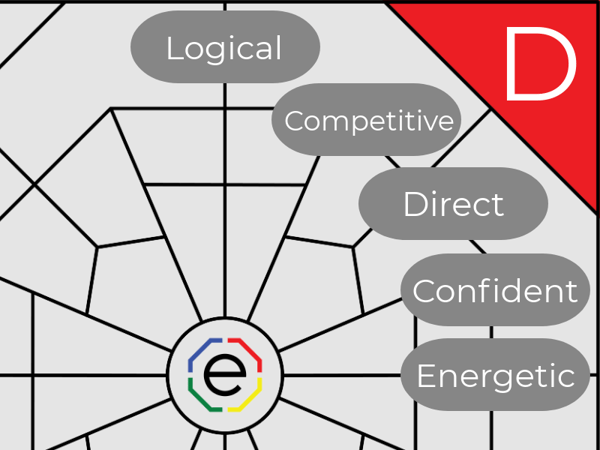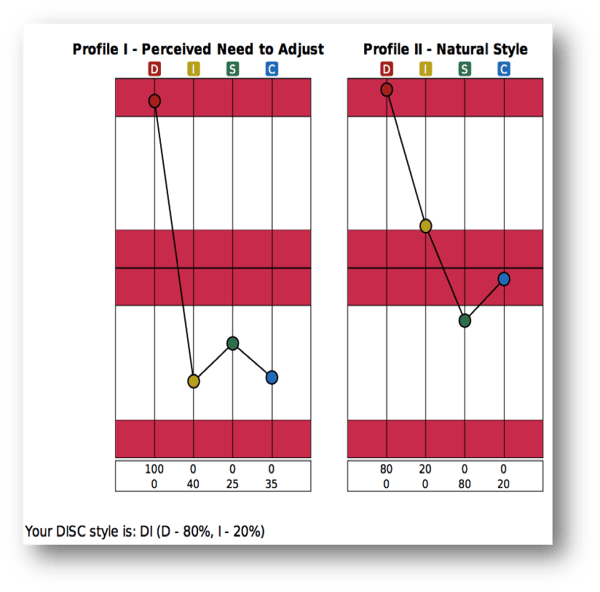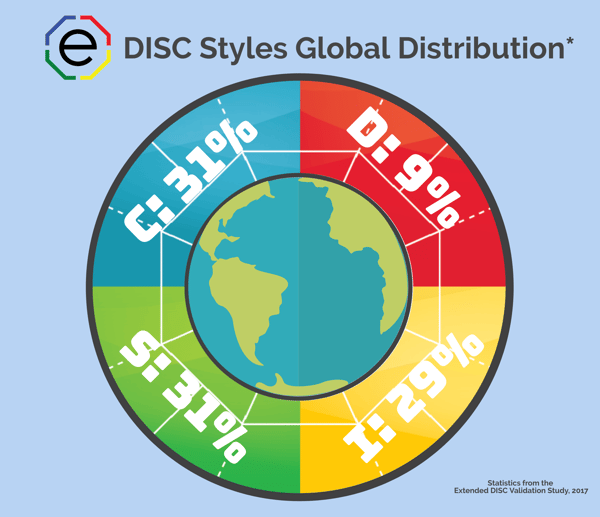As a DISC trainer, people often tell me their DISC styles. So, why am I sometimes doubtful when they tell me they're a D-style?
 Many of us, during our professional careers, have taken a behavioral assessment; oftentimes it's a DISC assessment. However, not all DISC assessments are the same. You should always ask yourself when reading your behavioral assessment report, 'can I trust the results?' What does your report measure?
Many of us, during our professional careers, have taken a behavioral assessment; oftentimes it's a DISC assessment. However, not all DISC assessments are the same. You should always ask yourself when reading your behavioral assessment report, 'can I trust the results?' What does your report measure?
What does Extended DISC measure?

Extended DISC tools focus on our natural hard-wired style. Our natural style is the behavioral style that is most comfortable to us and takes the least amount of energy. Essentially, it identifies our preferred way of doing things. Our natural DISC style tends to be fairly steady, but not rigid, throughout the course of our adult lifetime.
Behavioral adjustments may be challenging and drain our energy, but we can still adjust. It is a behavioral tool; it does not account for our skills, experience, attitude, intelligence, etc. There are other aspects of who we are, such as our values and personality, which tend to be more rigid. Extended DISC assessments help us understand our preferred way of doing things. While we may prefer to stay within our natural style, we can and do have the ability to adjust our natural style all day long. In the end, the Extended DISC tool provides us a behavioral road map. We have a clearer starting point to effectively modify our style.
While all DISC tools are based on the DISC theory, they do not always measure the same thing. There are some tools that measure our work/role behavior or adjusted style. Our adjusted style changes with different roles and pressures from the environment. It can be quite challenging to make solid behavioral adjustments based only on our constantly changing perception of how we should adjust. So, we don't always know if every assessment is identifying our natural style or who we 'think we need to be'.
Hello D-style?
 In certain parts of the world, and specifically in the business world, people often project and value the positive aspects of the D-style. We often admire their decisiveness and take-charge approach to getting things done. However, we may ignore or not own the negative aspects of the D-style. When D-styles overuse their strengths, they have a tendency to overlook how their actions and behaviors affect others or take too many risks.
In certain parts of the world, and specifically in the business world, people often project and value the positive aspects of the D-style. We often admire their decisiveness and take-charge approach to getting things done. However, we may ignore or not own the negative aspects of the D-style. When D-styles overuse their strengths, they have a tendency to overlook how their actions and behaviors affect others or take too many risks.
Approximately 9% of individuals taking the Extended DISC Assessment are dominant D-styles (Extended DISC 2017 Validation Study). Demographics for I-styles, S-styles, and C-styles are more evenly divided amongst the remaining 91%. You can easily see that D-styles are not as large a group compared to the other DISC styles. The independent D-styles fear loss of control, so you can only imagine a room full of D's where everyone wants to be in charge.
So, why do I seem to meet so many D-styles? There are other assessments out there that result in a higher percentage of D-styles. Again, Extended DISC tools focus on our natural style over our perceived need to adjust. It's like understanding who the person truly is, versus the person who showed up ready to impress in an interview. Do you know what your DISC tool truly measures?
I'm really not picking on you D-styles!
 In this blog, I'm focused on D-styles, but, I could apply it to any DISC style. Full disclosure though - D-style is my least comfortable style. So, while I may tend to pick on D-styles more because it's not my style, I also tend to envy them for their confidence and competitiveness. They are more comfortable making cold decisions, which makes my life better and more productive.
In this blog, I'm focused on D-styles, but, I could apply it to any DISC style. Full disclosure though - D-style is my least comfortable style. So, while I may tend to pick on D-styles more because it's not my style, I also tend to envy them for their confidence and competitiveness. They are more comfortable making cold decisions, which makes my life better and more productive.
As with every DISC style, there is no style that is better or worse, or good or bad; they are simply different. Every style has its strengths, as well as their areas of development. Our DISC profile does not limit our ability to succeed nor does it predict our success. By building a stronger self awareness, we can choose to use our behavioral strengths or make effective adjustments needed to succeed.
You are who you are. The DISC tool is not designed to fix you because you are not broken to begin with. It's designed to make you more effective in your interactions by building self-awareness, understanding others, and knowing how to adjust when needed. Ultimately, the most successful people own their natural style and know when to adjust their style appropriately. So, D-style or not, I'm glad to meet you!
